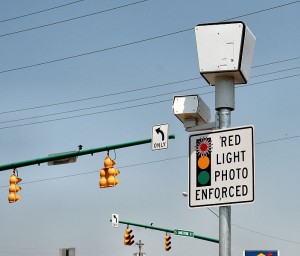 When I lived in Queens, New York in the late 1990’s I had the unpleasant experience of receiving a few red light camera tickets. Since I was the only one who had access to my vehicle, which was visible in the blurry photo enclosed with my “bill”, I did nothing more than mutter to myself and break open my checkbook. I don’t recall whether there was a way to challenge the summons.
When I lived in Queens, New York in the late 1990’s I had the unpleasant experience of receiving a few red light camera tickets. Since I was the only one who had access to my vehicle, which was visible in the blurry photo enclosed with my “bill”, I did nothing more than mutter to myself and break open my checkbook. I don’t recall whether there was a way to challenge the summons.
In today’s tough financial times, municipalities across the country are turning to red light cameras as a way to increase revenue. Rather than acknowledge this “tax”, use of the cameras is portrayed as a way to improve traffic safety. However, there is evidence that suggests just the opposite: that red light cameras actually cause car accidents and make our highways less safe.
A motorist in Tennessee is now seeking suppression of evidence obtained by use of a red light camera, arguing that the private company that owns and operates the camera was not licensed for private investigation. For more information on the situation in Tennessee, as well as a great analysis of use of these cameras in general, read this article from Clarksville Online. I am curious to see how the case turns out.
There is one federal case that has addressed the use of red light cameras. Idris v. City of Chicago was decided in January by the 7th Circuit Court of Appeals. The court upheld use of the City of Chicago’s red light cameras. In its decision, the Court ruled that the plaintiff’s substantive due process claims were not violated because “there is no right to run red lights or avoid being seen by a camera on the street.” The Court wasn’t bothered by the fact that the plaintiff was denied the opportunity to question or challenge the circumstances surrounding the taking of the photograph, or to cross examine the person controlling the camera. The court was also dismissive of the claim because “the interest at stake – a $90 fine for a traffic violation – is too modest to be considered a fundamental right.” Ninety bucks is not a big deal to a Judge making $170,000 a year with a lifetime appointment, but it might mean a bit more to your average Joe trying to get by in today’s economy.
The Supreme Court, however, may be prepared to take these due process claims a little more seriously. That’s because of the recent decision in Melendez-Diaz v. Massachusetts. That case involved the admission into evidence of a laboratory report as drug evidence. Justice Scalia, writing for the majority,argued that “the ability to confront witnesses is essential to ensuring that the potential for bias or error in scientific testing is uncovered.” See this post from The Newspaper.com for more information. Scalia recognized the serious constitutional issues involved, saying “We do not have license to suspend the Confrontation Clause when a preferable trial strategy is available.”
So, is all this confrontation clause stuff just theoretical? Does it really matter whether a driver has a right to cross examine the operators of these cameras? French lawmakers have recognized the inherent conflict of interest when the operators of speed cameras certify the accuracy of their own equipment. These same arguments can and should be made regarding red light cameras.




{ 3 trackbacks }